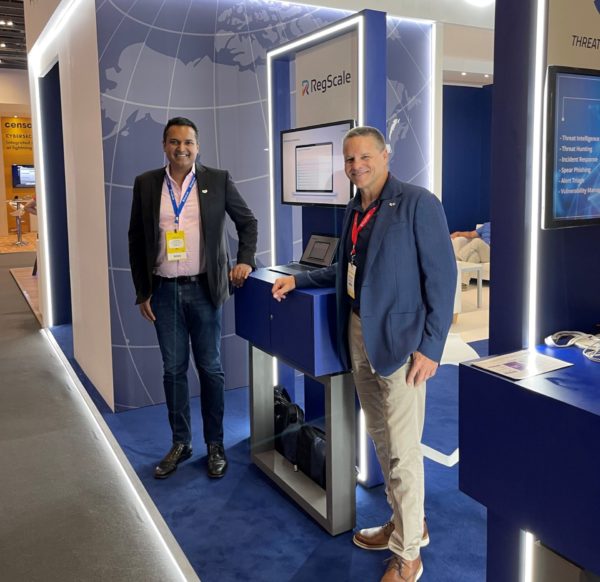For Anil Karmel, founder and CEO of Virginia’s RegScale, companies are and should be desperate for compliance tech.
But compliance, the fancy word for making sure that your technology or company practices meet all regulatory requirements, is an industry that hasn’t seen the updates it needs, if you ask Karmel. It’s something that takes time and energy, and it often looks like legal meetings and spreadsheets — which isn’t sustainable as companies grow.
“Compliance tech, historically, has been Word and Excel,” Karmel told Technical.ly. “That’s the world many people have lived in for decades.”
Compliance startups have filled this void, continuing to pop up and make noise over the past few years. Just eight months after launching, RegScale nabbed a $20 million Series A in 2022. Standd, another compliance-focused startup, won “Best Pitch” at Techstars Seattle Demo Day and was selected for the AWS Impact Accelerator for Women alongside Cleare, yet another compliance company that focuses on daycares.
All in all, it’s an industry on the rise, and as the epicenter of government and regulations, DC wants to be a part of it.
The beginnings
Julie Saltman, the founder of DC’s Standd, said that part of this subsector’s rise comes from the fact that regulation is getting more and more complicated. As privacy needs rose over the past decade, she said, it’s gotten harder to keep up with state and federal laws and best practices.
As a former regulatory lawyer, she said the current issue is largely an information problem, with too much to keep track of. Companies, especially smaller ones, can weekly compliance checkups with lawyers too expensive.
And, as anyone who even loosely follows the industry knows, technology’s strength is managing large amounts of constantly changing data.
“Technology is really good at making complicated workflows and complicated information more seamless, more easy to understand,” Saltman said. “So it seems like a great opportunity.”
Tisia Saffold, the founder and CEO of DC-based Cleare, said that she first noticed a need for this kind of software as a childcare consultant. Childcare center workers, she said, are often terrified of the licensing processing and upcoming inspections, especially since many operate out of people’s homes. At the same time, it’s one of the most highly regulated industries because workers typically deal with children and infants under five.
Tech, she thinks, can be a great solution to alleviate some of that stress and let workers focus on the kids. But tech is still very new to childcare.
“If you have a dentist appointment, you can now fill out your forms online, but the daycare industry isn’t really quite there,” Saffold said. “And it’s important because of the violations or citations that daycare providers get, it’s mostly for paperwork and small oversight.”

Karmel has found that the same need to shift is true of other industries and startups as well. He’s seen many new players enter the market to solve this problem as the world becomes increasingly interconnected. While every system used to be very siloed, more cloud computing and connection means there’s more data to manage, but tech can help make audit-ready compliance documents available instantly.
“You need to have really good compliance technology,” Karmel said. “But to take advantage of good technology, you need a cultural transformation coupled with technology to really allow you to take advantage of what that technology can bring you and has to offer, and allow you to truly and safely modernize your organization.”
The now
Compared to 10 or 20 years ago, Karmel also sees many more regulations that companies need to follow. In 10 to 15 years, he added, there will be even more, which is why he thinks technology is and will continue to be a key part of the process.
Still, he said that there will always need to be a human involved because technology can never really replace a person.
“A human is going to be required to fully understand what is the compliance gap and the associated risk to the organization and the cost to mitigate that risk,” Karmel said. “There can be suggestions that are presented to you by technology, but only a human can truly understand: ‘Okay, this is what this means to my organization.’
In compliance, Saffold said, there are things that companies need to do just to keep their doors open (a restaurant can’t open without a health inspection, for instance, nor a bar without a liquor license). But she thinks the potential in the government contracting ecosystem has brought many to the compliance tech industry. Instead of needing to get a thousand customers, a startup just needs one government contract.
“For a while, it was just a very black and white, very boring space,” Saffold said. “But instead of catching a hundred goldfish, you get to give one whale.”

For non-government companies, though, compliance is necessary as they bring on more technology for daily operations. Founders and higher-ups need to be careful about what technology vendors they’re working and partnering with, as well as keep track of safety and security. That can be hard for small companies without a compliance team, especially as they try to grow. For those trying to expand into a different state, for example, they might have to work with an HR tech company to make sure they’re staying within state laws.
At the same time, not being compliant can risk anything from a deal falling through to huge fines or bad press that can damage a brand, Saltman said. Or, companies could be sharing employee or customer data in ways they might not know.
“As technology becomes more powerful and more integrated into our lives, I think everybody is concerned about the consequences down the road for just agreeing to share their data,” Saltman said.
The future
Saffold feels like this movement to modernize will really show up in childcare in the next two to three years, similar to how the construction industry shifted to technology for measurements, inspections and more.
“The industry is not going to be able to survive not having a paperless solution, it’s just not going to work,” Saffold said. “So, we can wait five years from now when paperless is a thing or I feel like I want to spearhead that movement.”
Karmel, too, feels like the present is the right time to make cutting-edge compliance decisions, as tools like generative AI emerge to help shape the industry. But he thinks it will be a compliance ecosystem with various vendors, where companies can build on top of technologies and tools to extend what they already have. And overall, he’s eager to see where it ends up.
“Compliance is an inherently boring task and it’s not the thing that gets people excited,” he said. “But the reality is: This is an area that hasn’t seen innovation in decades and is ripe for disruption.







